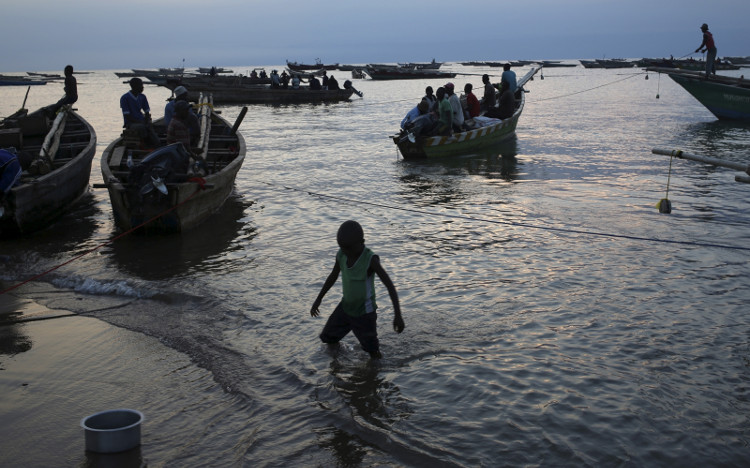The deepest lake fish in Africa is increasingly scarce
Recent research by US scientists shows that fish species in Lake Tanganyika, the oldest and deepest lake in Africa, are increasingly scarce due to global warming.
The study is published in the August issue of the National Academy of Sciences.
To carry out the study, scientists took sediment samples from the bottom of the lake to analyze ecosystem changes in Tanganyika since 1,500 years to date.
Analysis results of sediment samples show that the temperature of Tanganyika lake water has increased since the 19th century, reducing the area of algae, the main food of fish species, leading to the decline of fish species.

Fishing at Lake Tanganyika.(Source: Reuters).
The study also points out that since 1946, the warming of lake water has reduced the habitat of fish and mollusks by 38%. Besides, the change in lake water temperature also reduces the amount of oxygen at the bottom of the lake, leading to the situation that the "resident" species of the bottom layer die slowly, including snails.
This conclusion further reinforces the assumption that the scarcity of fish in Lake Tanganyika is caused by the warming of the Earth, not entirely due to over-fishing by humans.
Arizona University soil research professor and research leader, Andrew Cohen, confirmed the number of the oldest fish in Africa began to decline since the 19th century.
According to Professor Cohen, the decline in fish fossils in this lake is parallel to the condition of lake water warming up, so overfishing is only part of the cause of scarcity of fish here. .
Lake Tanganyika is one of Africa's largest lakes , covering part of the three Tazania, Burundi and Democratic Republic of Congo countries. It is known for its diversity of ecosystems with hundreds of unique and unique species found only in Lake Tanganyika.
Fishing activities in Lake Tanganyika have been licensed since the 50s of the last century, with an output of about 200 tons of fish per year.
- Mysterious legend in the world's deepest freshwater lake
- Algae invade the deepest lake in the world
- Russians conquer the deepest lake in the world
- Lake Kivu
- Life in the deepest trench of the ocean
- Why is it more difficult to sleep?
- Lake Victoria - the precious jewel of Africa
- Nearly 3 tons of diamonds have been dug up from one of the deepest holes in the planet!
- The deepest fish in the world
- 'Ghosts' in the world's deepest ocean trench
- West Lake management board: 'Many dead fish may be due to weather changes'
- The ancient 'city' mystery at the bottom of the lake no one knows for thousands of years
 Animal 'suffering' after hibernation
Animal 'suffering' after hibernation Why do goats climb well?
Why do goats climb well? Scientists were surprised to see chimpanzees eating turtles
Scientists were surprised to see chimpanzees eating turtles Giant catfish died deadly due to drought in Thailand
Giant catfish died deadly due to drought in Thailand